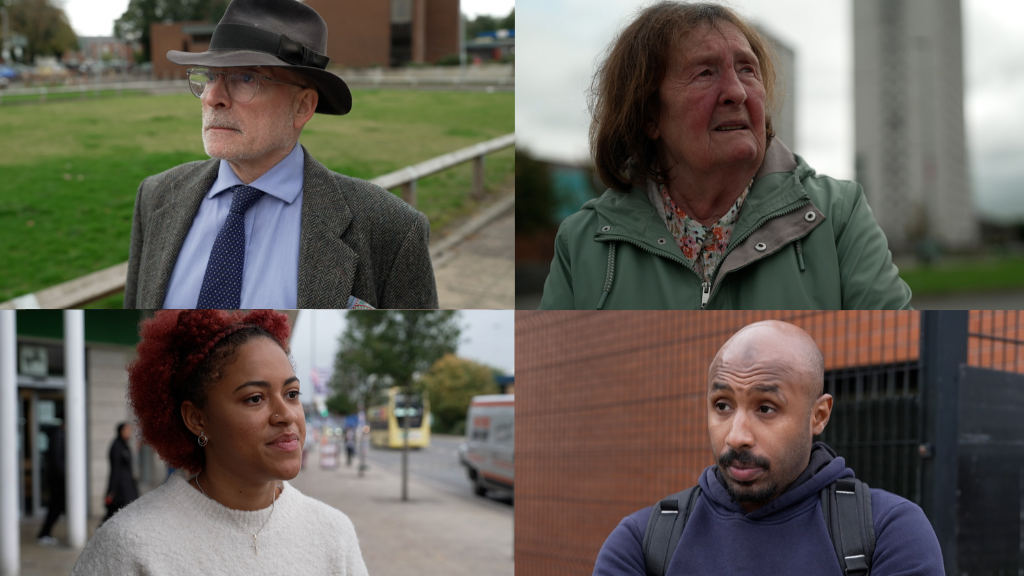Earlier this week former England and Manchester United footballer Gary Neville posted a video to social media, criticising what he called “negative” use of the British flag.
In recent months, people in some communities have hung Union Jack and St George’s cross flags from lampposts, including Salford – where Neville is a part-owner of the local football club.
Neville said he had seen 50 to 60 while driving to the club’s stadium along nearby Littleton Road, and that he had ordered a flag to be removed from a building site he has invested in, because of his belief that the intent of those flying the flags is to sow division at a time when immigration is a major political issue.
“I love my country, I love Manchester, I love England,” Neville said. “But I’ve been building in this city for 15-20 years and nobody has put a Union Jack flag up, so why do you need to put one up now?
“Quite clearly, it’s sending a message to everybody that there’s something you don’t like.”
Neville doubted whether flags are a true representation of patriotism.
“I just kept thinking as I was driving home that we’re all being turned on each other. And the division that’s being created is absolutely disgusting. Mainly created by angry, middle-aged white men, who know exactly what they’re doing.”
Leader of the Opposition Kemi Badenoch called Neville’s comments “disgraceful”, while Reform UK leader Nigel Farage – who earlier this year compared the UK to North Korea when asked about free speech by a US Congressional committee – called Neville “detached from reality” and said he was “amazed” Neville has kept his job as a pundit with Sky Sports.
On Wednesday evening protesters unfurled a banner calling Neville “traitor scum” outside Hotel Football, the business he part owns which is located next to Old Trafford.

On Littleton Road, on the approach to Salford City’s Peninsula Stadium, dozens of Union Jacks have been zip tied to lampposts in recent months.
“It’s representing the United Kingdom isn’t it?”, says Andy, 43, who lives on the road. “Neville has got a bit of a point [about negative uses], but we should be able to put the flag up when we want.”
It takes about 20 minutes to walk the length of Littleton Road, and then another 30 or so to reach Salford Shopping Centre. The whole stretch is full of newly affixed flags on both sides of the road.
“I don’t mind the flags being put up, but I think it’s got to be for a reason which is peaceful,” says 68-year-old former NHS worker Adrian. “It’s got to acknowledge support for the United Kingdom, with no wicked intent against other individuals or groups.”
For some, the fact that flag flying in urban areas has become much more common at a time when anti-immigration sentiment and marches have increased means the intent is inherently suspicious.
“I’m a Man City fan, but I agree with Gary Neville!”, says Mark, 43. “Some people genuinely are trying to show their national pride, but there are also people with more nefarious reasons doing it. I’m proud to be British, but I wouldn’t be flying a flag right now because of the negative connotation. It seems to have been hijacked by bigger things at play.”
There are plenty of flags on display outside private homes in the area too, and some are defiant about their individual demonstration of national identity.
“I’ve got one in my garden, and I’m not taking it down for anybody,” says 75-year-old Ken. “I’ve had people knocking and asking me to take it down, but I won’t.”
The context in which people choose to fly the flag was a key theme residents deemed important.

For some of those who have moved to the area from elsewhere, the flags constitute something of an unwelcoming message.
“The Union Jack itself is a national pride thing – every country has the right to be patriotic,” says 21-year-old Norcady, who was raised in Gibraltar and recently moved to Salford. “But there are certain groups making it about political opinions, which I don’t think they should.
“Some of the people who have flags on their houses don’t seem the most welcoming – I’ve gotten a lot of [unpleasant] looks. I think it’s sad if people who are genuinely patriotic about their country won’t be able to use the flag because others are using it in the wrong way.”
A lot of the discussions around flag flying centres on whether or not it is designed to intimidate those from other countries.
“For me, I see no problem with the flag”, says Youssouf, 39, who was born in Somalia before moving to the UK. “It represents the country and it’s a beautiful colour. It’s up to any geezer putting one up what his intentions are.”
Disagreement about what the British flag stands for and how it should be used is not a recent phenomenon.
“From the first flying of the Union Flag in 1606 its meaning has been an issue,” says Nick Groom, author of The Union Jack: The Story of the British Flag. “There are no laws or regulations about flying the flag on land – you can do what you want with it.
“The flag has many multiple contexts that determine how it is understood. There are attempts to politicise it, but it is a flag of the people. It is important that it isn’t turned into a representation of one political faction.
“Events like the 2012 Olympics show how the flag can bring people together – it is a flag of community.”
What every Salford resident the BBC spoke to had in common was that they felt intention is key – those flying a Union Flag out of pride were encouraged to do so, while anybody whose intentions are more aggressive or divisive were criticised.
Related topics
- Manchester United
- Salford City
- Football
Source: BBC

Leave a Reply